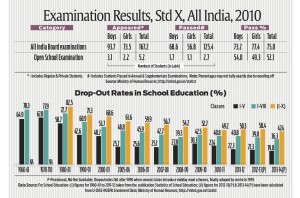http://www.dnaindia.com/analysis/column-policy-watch-the-rot-begins-at-schools-2105831
The rot begins at schools
“Make in India” is a good slogan. But it depends critically on the making of people, character-building, even basic literacy in India. All this begins at school. School education is the most enduring way to reduce inequality as it empowers even the poorest and the most backward. It gives them a fighting chance to take on the world. If education is well managed at schools, job reservations should not matter at all. Yet Smriti Irani, minister, human resources development, seems to have overlooked the signs of decay.
1. Survey after survey has shown that many Std V students cannot understand words, sentences or even simple maths taught to Std II students (http://dnai.in/8TK7).
2. India’s PISA scores have been terrible. India’s embarrassing show in 2009, prodded Kapil Sibal, the then minister, to back out of PISA 2015.
Yet, instead of improving school education — where the very foundation of a country is shaped — Irani has focused on institutes of excellence (IITs, IIMs etc), which have been doing a relatively excellent job all along.
There are three things the minister could do:
First: Focus on introducing a national school standard of education — as is done globally. This examination should evaluate students on their quantitative (maths) and verbal skills, along the lines of the ubiquitous GRE or TOEFL. True, school education remains the prerogative of state governments. But Irani’s ministry could strategically work with the finance ministry to link educational funds to quality education. That will ensure that good money is not poured over bad jobs. It will ‘persuade’ state boards to improve their educational standards.
The chart provides a simple way of doing this.
It tells you that over 75% of the students appearing for Std X examinations passed in 2010 (the latest data available from the ministry website. Unfortunately, the ministry overlooks the fact that “Make in India” requires analysis of current data; not that which is five years old). Compare this with the (voluntary) open examinations that the government holds for Std X students all over India. The pass percentage is just 52%.
Normally, students opting (voluntarily) for a second examination in order to vet their grades are bound to be of above-average-intelligence and scholastic aptitude. Yet, in spite of this, passing scores are lower. This leads one to conclude that marks are allotted quite generously at Std X board examinations conducted by various boards. Discussions with examiners confirm that even if a student gets only 15 marks out of 100, he is ‘graced’ up at different stages, so that he emerges with the required 35% passing grades.
All this means that at least 25% of the students promoted by examination boards are those who ought to have been detained. This is clearly a case of populism permitting a deliberate degradation of standards. Must taxpayers pay for this decay?
Three reasons compel state governments to permit liberal promotions and even more generous marks:
(a) to show to the world that they have more high-school-students; (b) to remain populist; (c) because the all-India entrance examinations to engineering colleges allow for a 30% weightage for Std X examinations. To ensure that their students get admission to the respective state engineering colleges, each board inflates marks of their own students.
That is terribly harmful. It makes students believe that they are more capable than they actually are. In turn, it prevents them from considering vocational skill options, and opt instead for college education.
Colleges thus get flooded with ‘sub-standard’ students, who later get agitated when their scores dip at college examinations (http://dnai.in/bYwe). That increases pressure on colleges to “dumb down” their syllabi, and promote students liberally. Not surprisingly, the best recruiters — Nasscom, TCS, IBM etc — admit that only 25% of the students are employable. That is why a national examination standard helps. The minister should make the Std X “Open examination” compulsory for all final year students.
Second: The minister should also stop the automatic promotion of students till Std VIII (that Sibal introduced as part of the Right to Education Act —http://asiaconverge.com/2010/05/sibals-kiss-of-death/). Not filtering out weak students each year, will confront examination boards with the need to detaining almost 50% of the students. Political pressure prevents them from doing this.
The government worries that detentions may result in dropout rates increasing. Not true. Dropout rates (see chart) declined only after 1990, when midday meals were introduced. The introduction of automatic promotions by Sibal did not improve dropout rates. What happened instead was that the quality of teaching and studying worsened (http://dnai.in/br5K).
Third: Work towards creating a system where the ministry tracks schools that don’t teach well. Comparing passing scores of the school with national passing scores could be a good starting point. If a school does not perform well for say three years out of five, the school with its assets should be transferred to another school management which has done a good job of educating students. This way, better performing managements are given charge of poorly-performing institutes. If the minister follows these steps, she could actually make the Prime Minister’s vision more enduring. Else, she will end up destroying even what works well in this country. But, more next week.



































COMMENTS